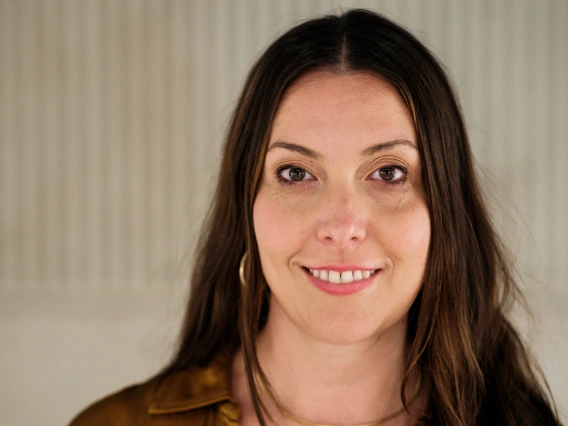
Dr. Ana Cornide, Associate Professor of Practice and Director of the Critical Service Learning and Community Outreach in the Department of Spanish and Portuguese, is the recipient of the University’s 2022 Koffler Prize.
Sponsored by the University of Arizona Senior Vice President for Academic Affairs and Provost, the Henry and Phyllis Koffler Prize is awarded annually, with rotating categories. Cornide is awarded for this year’s category of Public Service/Outreach. The prize, established through the generosity of Henry and Phyllis Koffler in 2000, consists of a one-time award of $10,000, a medallion and certificate.
In a nomination letter, faculty colleagues lauded Cornide for both her innovation and dedication in developing and leading the Critical Service-Learning Program, as well as the immense impact the program has had on both students and the community. The letter was signed by three Spanish and Portuguese colleagues—Department Head Santa Arias, Regents Professor Sonia Colina, and University Distinguished Professor Melissa Fitch—as well as Marla Franco, Assistant Vice Provost for Hispanic Serving Institutions Initiatives, and Colin Deeds, Assistant Director of the Center for Latin American Studies.
“Dr. Cornide trains her students to make remarkable contributions to local, national, and global communities, becoming agents of positive change during their undergraduate years and post-graduation,” they wrote. “She inspires profound admiration and gratitude among all who are fortunate enough to work with her.”
Through the program, Cornide connects students with the community through partnerships and approved internships. The learning opportunities that come through social entrepreneurship, leadership, and community-based projects and outreach have transformative impacts in multiple ways, she said.
“My emphasis on civic engagement reflects my commitment to community-based learning and service projects that facilitate transformative experiences,” Cornide said. “Interdisciplinary collaboration and community engagement change how students learn and develop. In both cases, the border between campus and community is blurred and reconfigured.”
Since the Critical Service-Learning Program began in 2014, Cornide has established partnerships with 62 organizations in education, human rights, law, public health, counseling, and diplomacy. Organizations include Consulado Mexicano in Tucson, YWCA, Legal Clinic at Catholic Services, CODAC, United Way, International Refugee Committee, Manzo Elementary School, The Florence Project, International School of Tucson, Pima County, and El Rio Community Clinic.
In that time, she has supervised 618 internships, offered various volunteer opportunities for students, implemented 12 new programs in partnership with local and regional organizations, and organized seven annual workshops for teachers of Spanish in Tucson and the Arizona-Sonora region. Prior to the Koffler Prize, her work was honored in 2016 with the Richard Ruiz Diversity Leadership Faculty Award.
“This symbiotic relationship between community and university allows an exchange of knowledge, a sharing of resources, and a constant locus of teaching and learning,” she said. “I am honored for this award and for the opportunity to enhance, embrace, and teach this critical service learning pedagogy. I look forward to many more years of service to my students and my community.”
Also writing in support of Cornide’s nomination were numerous partner organizations, students, and additional faculty colleagues:
“Personally, as an adjunct faculty in Mexican American Studies during the tenure of Dr. Koffler’s presidency at the University, I imagine he would consider Dr. Cornide’s excellent record of university/community building to be ‘the’ model needed for a public state university and certainly worthy of recognition,” wrote Raquel Rubio-Goldsmith, retired university faculty member and founder of the Binational Migration Institute.
“I have met many of the students from Dr. Cornide’s class, and I can immediately tell who they are. Her students understand the real meaning of giving back to the community and making a genuine impact,” wrote Stephanie Navarro, manager of Clínica Amistad.
“Dr. Cornide’s innovative service program is a model to follow for making positive and impactful change in our community, while also allowing young professionals such as myself to discover themselves, as well as the importance of volunteering,” wrote Spanish student María Siqueros.
“Dr. Cornide revolutionized the culture of service to the community and the student body in our department from the very first moment she arrived. I have never witnessed, in the 24 years I have been teaching at the U of A, anybody who has had a bigger and more immediate impact in our departmental life than Ana,” wrote Antxon Olarrea, Professor of Hispanic Linguistics.
After detailing the “direct, measurable impact of Dr. Cornide’s work,” the nomination letter described the “incalculable impact” as well.
“Since she arrived at UA in 2014, her work has enhanced the lives of thousands of individuals of all ages and from all walks of life,” wrote Cornide’s faculty nominators. “The students and teachers whose lives Dr. Cornide has touched during her seven years at the University of Arizona will, in turn, go on to transform the lives of others within their reach—those of their students and their communities. As such, the positive ripples and impact of Dr. Cornide’s work extend ever outward into our region, our country, and the world.”

